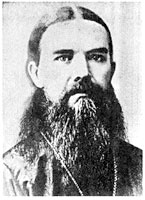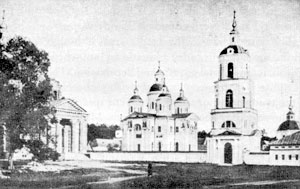The Life of St. Theophan the Recluse
During the nineteenth century the Russian Orthodox Church witnessed an outstandingly rich flowering of the spiritual life. [One] of the greatest writers in this movement [was] Bishop Theophan "the Recluse..." His reverence for the Fathers is evident in everything that he wrote: although explicit quotations are comparatively infrequent, he always keeps extremely close to their teaching... Despite his scholarly background, Theophan had a special gift for expressing himself in direct and lively language. [In his correspondence] he wrote in answer to practical questions and specific personal problems; and so he wrote simply, in terms that could penetrate straight to the heart of these spiritual children whom he had never met, yet understood so well. Deeply rooted in the tradition of the past, and at the same time through his correspondence kept closely in touch with contemporary problems, Theophan represents much of what is best in the ascetic and spiritual teaching of the Orthodox Church.
[From the Introduction by Timothy (now Metropolitan Kallistos) Ware to The Art of Prayer - An Orthodox Anthology.
Early Life
 St. Theophan the Recluse (1815-1894) was born George Govorov in central Russia, near Orlov. His father was a parish priest, and his father sent him to seminary to be trained to be a priest as well. He attended the Kiev Theological Academy, receiving the best theological education available. He took monastic vows, and after the vows and tonsuring, he met the staretz (holy elder, spiritual guide) Parthenii at the Kiev Caves Lavra (monastery), and later wrote about this meeting,
St. Theophan the Recluse (1815-1894) was born George Govorov in central Russia, near Orlov. His father was a parish priest, and his father sent him to seminary to be trained to be a priest as well. He attended the Kiev Theological Academy, receiving the best theological education available. He took monastic vows, and after the vows and tonsuring, he met the staretz (holy elder, spiritual guide) Parthenii at the Kiev Caves Lavra (monastery), and later wrote about this meeting,
The staretz said to us, "You learned monks, ... you are going to work and learn and write, but you must remember above all that the most necessary thing on earth is to pray to God, to pray unceasingly with your whole heart and your whole mind. This must be the goal you will search for without interruption." A monk must start by speaking the prayer aloud, then without uttering any sound until it springs silently from him day and night.
When the holy staretz said this, I discovered that this was what I had always wanted since my early childhood, and that very day I prayed from the depth of my heart to the Lord that nobody would hinder me from remaining constantly with God. [From The Heart of Salvation, pp. 12-13]
Priest and Scholar
After graduating, he was ordained a priest. He was inspired by the life and teachings of St. Tikhon of Zadonsk, who labored to bring the great Patristic teachings to the common people. He spent many years abroad, in Jerusalem, Constantinople, and Mount Athos, the "holy mountain" of monasticism in Greece, and he studied, copied and collected treasures of Patristic writing that he would later translate into Russian, including extensively editing and revising the Russian Philokalia, more than doubling its original size. He became a professor and ultimately dean of the Theological Academy of St. Petersburg.
Reclusion
 After returning to Russia, he later became Bishop, first of Tambov, then of Vladimir. But after only seven years as a Bishop, he resigned his position and retired to a monastery at Vysha where he lived simply, secluded in only two rooms, for 28 years, spending his life in prayer and silence.
After returning to Russia, he later became Bishop, first of Tambov, then of Vladimir. But after only seven years as a Bishop, he resigned his position and retired to a monastery at Vysha where he lived simply, secluded in only two rooms, for 28 years, spending his life in prayer and silence.
What reasons induced Bishop Theophan, full of strength, to leave his diocese and retire into solitude? Various are the characters and gifts of men. It was difficult for him in the midst of the world and those demands to which one must yield as a consequence of human corruption. His unlimited goodness of heart, a meekness like that of a dove, his trust of people and indulgence of them-all this indicated that it was not for him to live amidst the irreconcilable quarrels of vain worldly life. It was very difficult for him to be a leader, especially in such an important position as that of bishop. His trust could be abused; he could never give necessary reprimands. Besides this, he felt the call to devote all his energies to spiritual writing. As for himself personally, he wished to give up all his thoughts to God alone, Whom he loved so absolutely. He desired that nothing might disturb the complete communion with God that was so dear to him. And he left the world to be alone with God.
In reclusion, invisible to people, he became a public figure of enormous magnitude. He sought only the Kingdom of God, and his great significance for the world was added to him. [From "Orthodox Word," July-August, 1966, quoted in Orthodox America.]
Surrounded by books, and having lived a life not only of academic study, but of ascetic practice of repentance, fasting, and unceasing prayer, he translated spiritual works and wrote extensively. Despite not interacting in person with others, St. Theophan did not cease to actively teach and guide many spiritual children. He read and replied to many letters every day, offering teachings that came to be so widely treasured that they were collected and published not only throughout Russia but beyond. His perspective was uniquely valuable for us even in our modern day because he was deeply steeped in ancient Patristic wisdom, yet he was conversant with the modern, post-Enlightenment, post-Reformation mind set and ways of thinking.
... in the Russia of Theophan's time the conflict between faith and reason was at its height. All Theophan's work has to be understood in this light. To Theophan, the new doctrines of the Reformation were followed by even newer forms of theology introduced by Protestant thinkers—strongly influenced by the scientific, humanist and rationalist thought of their time. To Theophan, acutely aware of the danger of subjecting scriptures to the agnostic reasoning that had resulted from the "Enlightenment", this "reform" was not a return to but a step away from the original truth—and history shows that he was correct. [From The Heart of Salvation, pp. 30-31]
And from the preface to The Path to Salvation,
St. Theophan was and is first and foremost a Church Father for modern times. He was almost our contemporary, one who lived consciously with an awareness of the results of the French Revolution, which had knocked down Church authority not so much politically as spiritually. It is precisely in this—his awareness of the roots of the modern age—that St. Theophan excels almost all modern theologians, pastors, and monastic teachers of spiritual life. He reinterprets ancient patristic wisdom in order to adapt it to the needs of the modern unchurched mind, which has been divorced from the Orthodox philosophy of life and even from the rudimentary principles of practical, basic Christianity, and has already been psychologically formed into the mind of a neo-pagan. [From Abbot Herman's preface to The Path to Salvation, pp. 11-12.]
Troparion of St. Theophan
O guide of Orthodoxy, teacher of piety and purity,
ascetic of Vysha, divinely wise and holy hierarch Theophan:
By thy writings thou didst explain the Word of God,
and hast shown the way to salvation unto all the faithful.
Entreat Christ God, that our souls be saved.
Kontakion of St. Theophan
O holy hierarch Theophan, namesake of the Theophany:
By thy teachings thou didst enlighten many of the people.
And standing now with the angels before the throne of the Holy Trinity,
pray thou unceasingly in behalf of us all.
Ikos
Thou hast truly been shown to be a revelation of divine gifts to the land of Russia,
O holy hierarch Theophan, good shepherd of the flock of Christ,
teaching them by thy way of life and guiding them by thy discourse and writings.
And now, standing before the throne of the all-holy Trinity,
and lifting up thy venerable hands with boldness,
pray thou unceasingly in behalf of us all.
